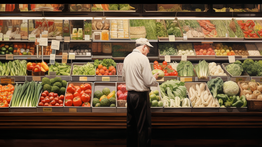

German farmers, with the support of truckers, have blocked numerous highways, causing widespread disruptions. Highways such as the A2, which is a critical east-west artery through Europe and Germany, have been affected by these protests.
In recent weeks, Germany has witnessed a significant uprising that differs from conventional political protests or cultural clashes. This movement is characterized by a nationwide revolt led by farmers, who are protesting against what they perceive to be government overreach through oppressive regulations. This movement is reminiscent of similar protests seen in Holland and Canada and raises concerns about food security in Germany.
German farmers, with the support of truckers, have blocked numerous highways, causing widespread disruptions. Highways such as the A2, which is a critical east-west artery through Europe and Germany, have been affected by these protests. The farmers have taken to the streets, even in freezing conditions, to express their discontent with government overreach. They have been joined by truckers, who share their concerns and stand in solidarity with the farmers' cause.
THIS IS HUGE🚜
— PeterSweden (@PeterSweden7) January 8, 2024
Polish truckers have now joined in solidarity with the German farmers protest.
SHARE - You won't see this video on the media👇pic.twitter.com/twFjVubFt7
Despite the scale and impact of these protests, coverage in mainstream media has been limited. The lack of widespread reporting on the issue has led to questions as to why such a significant event is not receiving more attention. This absence of coverage has left many people uninformed about the situation unfolding in Germany.
The heart of the issue lies in the dissatisfaction with regulations that farmers believe are threatening their way of life and their ability to produce food. Farmers have expressed that they feel under attack by political forces and have accused the government of being out of touch with the needs of the most productive members of society. There is a perceived divide between the common people, including farmers and truckers, and the political elite.
Beyond the immediate agricultural concerns, there is an argument that German culture and economic stability are at risk. The farmers' protests can be seen as a response not only to specific agricultural policies but also to broader socio-economic policies, including energy policies that have been described as self-inflicted wounds on the economy.
The protest can be contextualized within the broader framework of social dynamics and responses to stress. When groups feel they are under undue pressure, they may take collective action against perceived sources of their distress. In this case, the farmers and truckers have identified government policy as the root cause of their troubles.
The farmer revolt in Germany is a significant development that reflects a broader sentiment of dissatisfaction and resistance against government policies perceived as detrimental to important sectors of the economy. The movement underscores the importance of understanding the impact of policy decisions on the livelihoods of citizens and the potential consequences when those citizens feel compelled to take action. The limited media coverage of this event suggests a need for a more comprehensive reporting landscape that includes diverse perspectives and issues affecting all segments of the population.